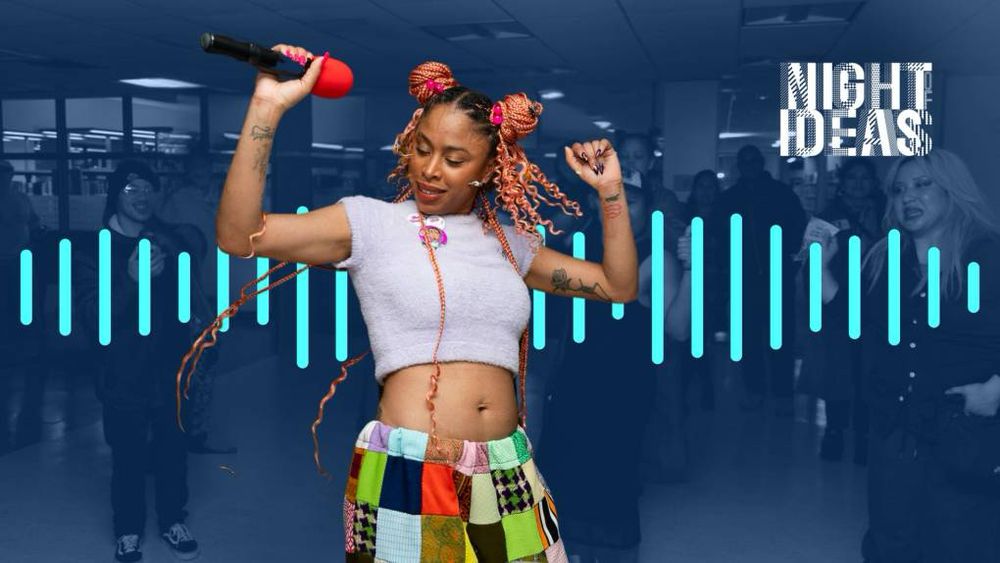
Strong statement today from UC's Academic Senate:
03.10.2025 21:58 — 👍 1112 🔁 369 💬 18 📌 25
![MILITARY RECRUITMENT AT UC DAVIS SCHOOL OF LAW
In accord with the University of California’s anti-discrimination policy and regulations
of the Associate of American Law Schools (AALS), the University of California, Davis
School of Law has a Non-Discrimination Policy & Statement of Equal Opportunity
providing that:
The UC Davis School of Law Career Services Office expects employers recruiting at
King Hall to share our belief that the diversity of our students' backgrounds,
experience and interests will enrich the legal profession.
UC Davis School of Law does not make its career services facilities or services
available to employers who discriminate in the selection of employees on the basis
of ... sex, gender, gender expression, [or] gender identity.
On January 27, 2025, President Trump issued an Executive Order directing the
Departments of Defense and of Homeland Security to revise their accession and
retention standards to presumptively ban service by people who are transgender,
finding that transgender status is “not consistent with the humility and selflessness
required of a service member” and with “a soldier’s commitment to an honorable,
truthful, and disciplined lifestyle.” A federal law, the Solomon Amendment, 10 U.S.C.
§ 983, denies most federal funding to a university that provides less access to military
recruiters than to other employers. For that reason, longstanding practice at King Hall,
as at other law schools, has been to grant access to miliary recruiters even when they fail
to comply with our policies.
As the U.S. Supreme Court wrote when it upheld the constitutionality of the Solomon
Amendment, “Nothing about recruiting suggests that law schools agree with any speech
by recruiters, and nothing in the Solomon Amendment restricts what the law schools
may say about the military’s policies.” Rumsfeld v. Forum for Academic and
Institutional Rights, Inc., 547 U.S. 47, 65 (2006). To make our position clear, we will
prominently post our non-discrimination…](https://cdn.bsky.app/img/feed_thumbnail/plain/did:plc:bviiczzhquhhqp6btmaw3z3r/bafkreieuvqbotdrob34z3fkj74ygjqg62fe64rbip24lzemyow5os5fq44@jpeg)
MILITARY RECRUITMENT AT UC DAVIS SCHOOL OF LAW
In accord with the University of California’s anti-discrimination policy and regulations
of the Associate of American Law Schools (AALS), the University of California, Davis
School of Law has a Non-Discrimination Policy & Statement of Equal Opportunity
providing that:
The UC Davis School of Law Career Services Office expects employers recruiting at
King Hall to share our belief that the diversity of our students' backgrounds,
experience and interests will enrich the legal profession.
UC Davis School of Law does not make its career services facilities or services
available to employers who discriminate in the selection of employees on the basis
of ... sex, gender, gender expression, [or] gender identity.
On January 27, 2025, President Trump issued an Executive Order directing the
Departments of Defense and of Homeland Security to revise their accession and
retention standards to presumptively ban service by people who are transgender,
finding that transgender status is “not consistent with the humility and selflessness
required of a service member” and with “a soldier’s commitment to an honorable,
truthful, and disciplined lifestyle.” A federal law, the Solomon Amendment, 10 U.S.C.
§ 983, denies most federal funding to a university that provides less access to military
recruiters than to other employers. For that reason, longstanding practice at King Hall,
as at other law schools, has been to grant access to miliary recruiters even when they fail
to comply with our policies.
As the U.S. Supreme Court wrote when it upheld the constitutionality of the Solomon
Amendment, “Nothing about recruiting suggests that law schools agree with any speech
by recruiters, and nothing in the Solomon Amendment restricts what the law schools
may say about the military’s policies.” Rumsfeld v. Forum for Academic and
Institutional Rights, Inc., 547 U.S. 47, 65 (2006). To make our position clear, we will
prominently post our non-discrimination…
Proud to see @ucdavislaw.bsky.social making its values clear, even as the federal Solomon Amendment pressures us to allow military recruiters to violate our nondiscrimination policies. These kinds of statements were common (in fact, required by AALS) during Don't Ask Don't Tell. What's changed?
05.09.2025 16:31 — 👍 5 🔁 0 💬 0 📌 0

Listen guys, if you're going to highlight this provision, you might also want to acknowledge the other provisions that require Columbia to restrict teaching, scholarship, and campus protest, and that limit the university's autonomy re admissions and hiring. www.nytimes.com/2025/08/19/u...
20.08.2025 13:02 — 👍 94 🔁 31 💬 2 📌 1
This:
27.06.2025 18:00 — 👍 2 🔁 0 💬 0 📌 0
BREAKING:
CASA (plaintiff in Maryland birthright citizenship case) has now filed an amended complaint seeking class certification for similarly situated individuals impacted by Trump’s EO.
www.law.georgetown.edu/icap/wp-cont...
27.06.2025 17:31 — 👍 1671 🔁 388 💬 37 📌 16
Orders with no accompanying explanation have no precedential force beyond the specific facts they apply to. The district court should grant this motion, and the lower courts should keep on granting relief until the Supreme Court articulates a rule of decision to the contrary.
24.06.2025 00:58 — 👍 32 🔁 10 💬 0 📌 0
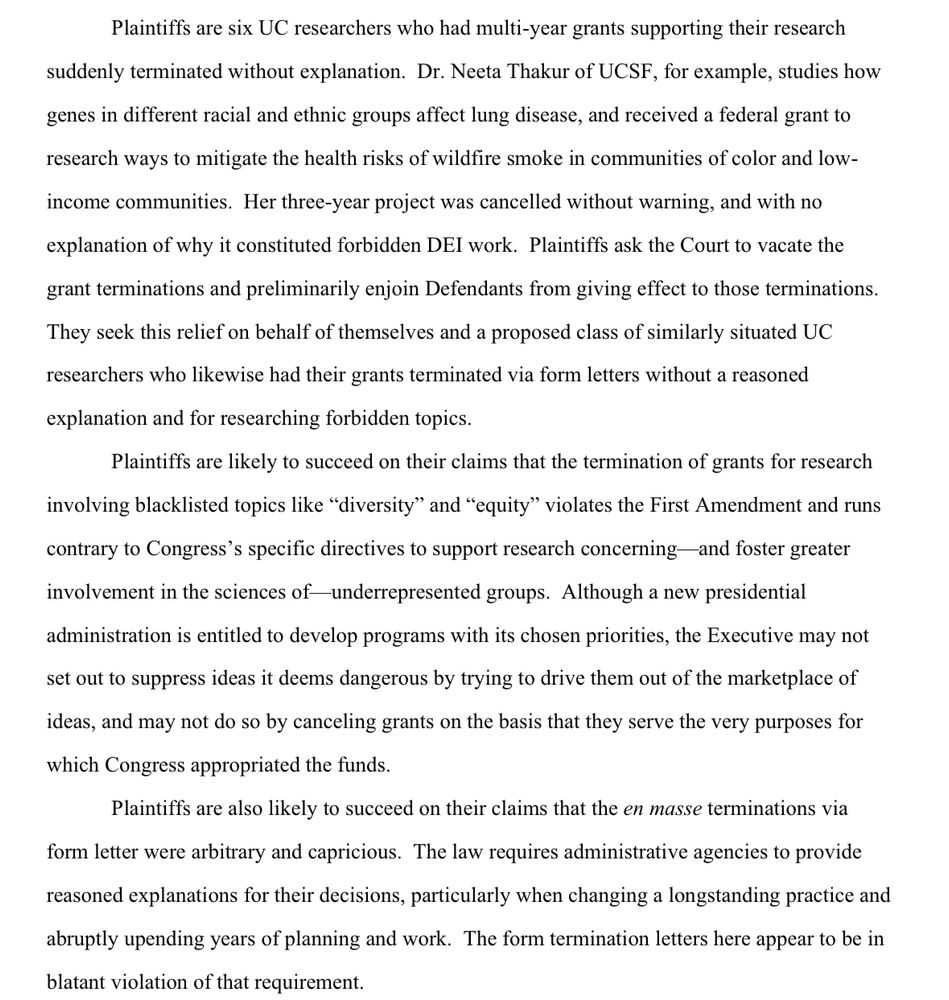
BREAKING: A federal judge has ordered the Trump administration to restore millions of dollars in canceled grants to University of California researchers, calling the terminations flagrantly illegal and unconstitutional. storage.courtlistener.com/recap/gov.us...
24.06.2025 01:07 — 👍 5393 🔁 1448 💬 71 📌 61
Absolutely this. Nicholas Confessore clearly wasn't going to let the actual decision get in the way of his thesis. To be clear: the Skrmetti Court is 3-3-3 on the question of "extending new constitutional protections to trans people."
19.06.2025 21:07 — 👍 3 🔁 0 💬 1 📌 0
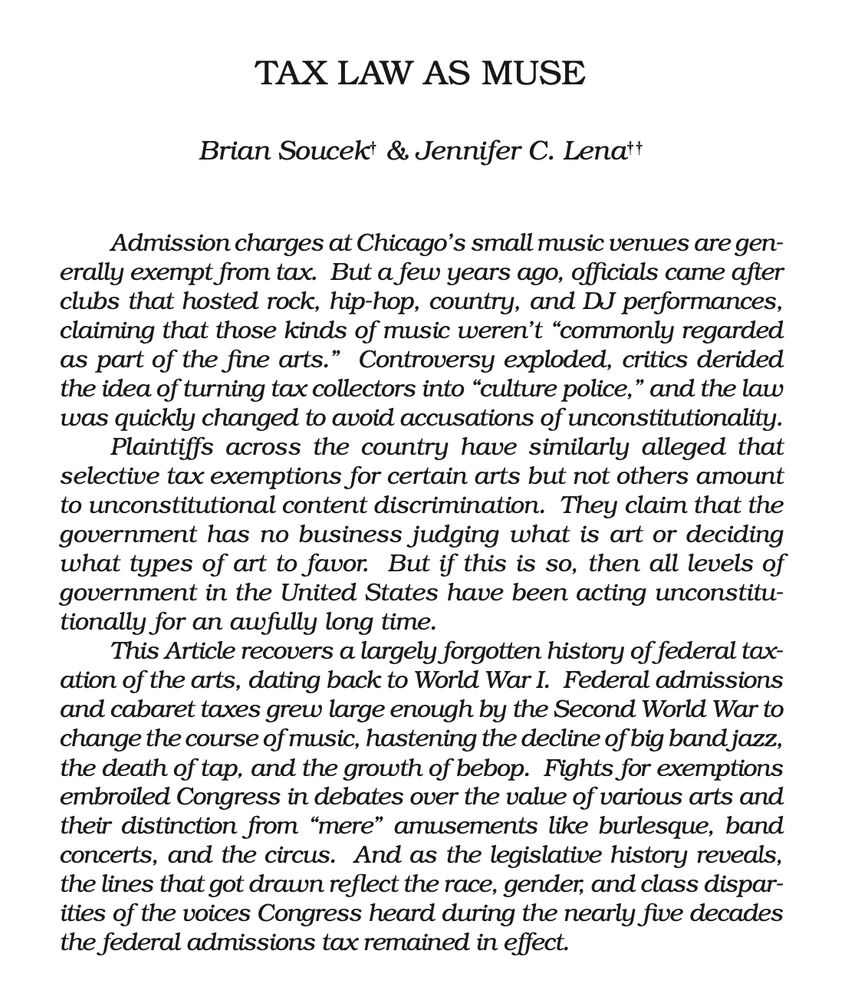
Tax Law as Muse
Brian Soucek & Jennifer C. Lena
Admission charges at Chicago’s small music venues are gen-
erally exempt from tax. But a few years ago, officials came after
clubs that hosted rock, hip-hop, country, and DJ performances,
claiming that those kinds of music weren’t “commonly regarded
as part of the fine arts.” Controversy exploded, critics derided
the idea of turning tax collectors into “culture police,” and the law
was quickly changed to avoid accusations of unconstitutionality.
Plaintiffs across the country have similarly alleged that
selective tax exemptions for certain arts but not others amount
to unconstitutional content discrimination. They claim that the
government has no business judging what is art or deciding
what types of art to favor. But if this is so, then all levels of
government in the United States have been acting unconstitu-
tionally for an awfully long time.
This Article recovers a largely forgotten history of federal tax-
ation of the arts, dating back to World War I. Federal admissions
and cabaret taxes grew large enough by the Second World War to
change the course of music, hastening the decline of big band jazz,
the death of tap, and the growth of bebop. Fights for exemptions
embroiled Congress in debates over the value of various arts and
their distinction from “mere” amusements like burlesque, band
concerts, and the circus. And as the legislative history reveals,
the lines that got drawn reflect the race, gender, and class dispar-
ities of the voices Congress heard during the nearly five decades
the federal admissions tax remained in effect.
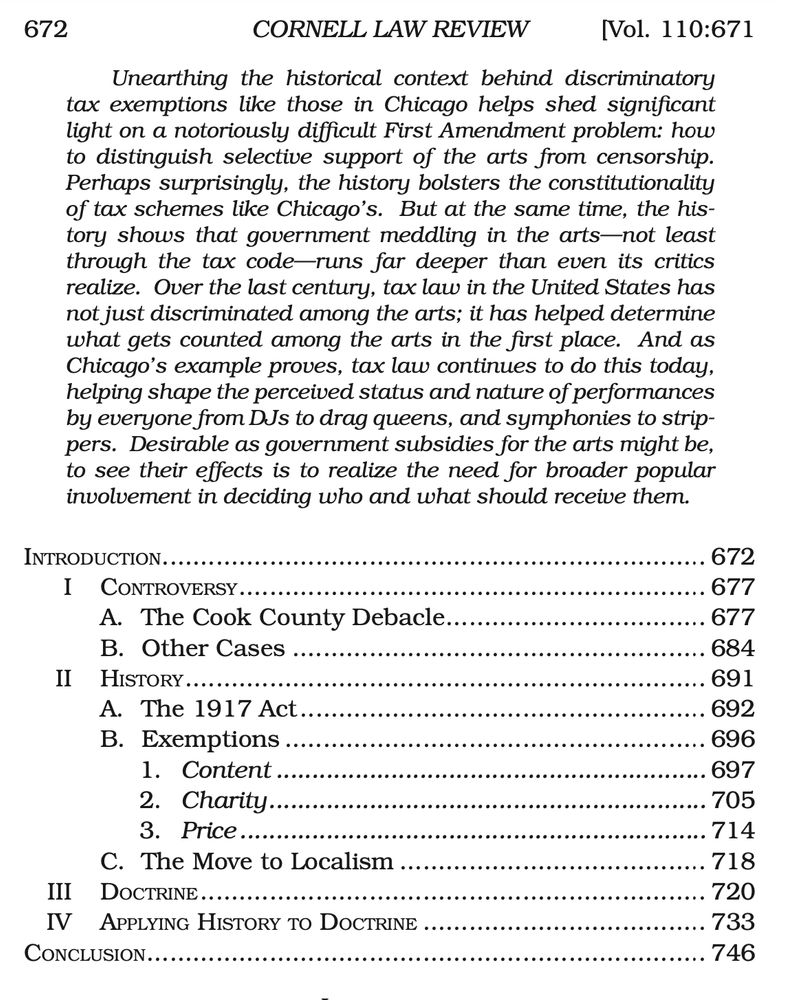
Unearthing the historical context behind discriminatory
tax exemptions like those in Chicago helps shed significant
light on a notoriously difficult First Amendment problem: how
to distinguish selective support of the arts from censorship.
Perhaps surprisingly, the history bolsters the constitutionality
of tax schemes like Chicago’s. But at the same time, the his-
tory shows that government meddling in the arts—not least
through the tax code—runs far deeper than even its critics
realize. Over the last century, tax law in the United States has
not just discriminated among the arts; it has helped determine
what gets counted among the arts in the first place. And as
Chicago’s example proves, tax law continues to do this today,
helping shape the perceived status and nature of performances
by everyone from DJs to drag queens, and symphonies to strippers.
Desirable as government subsidies for the arts might be, to see their effects is to realize the need for broader popular involvement in deciding who and what should receive them.
Think the government shouldn't be defining what's art? Think the arts deserve government funding? Uh oh...you can't think both. My article with the amazing @jenniferlena.bsky.social is finally out, and it tells a 100-year history of tax law shaping what we see as art versus other forms of amusement.
12.06.2025 21:11 — 👍 4 🔁 1 💬 1 📌 0
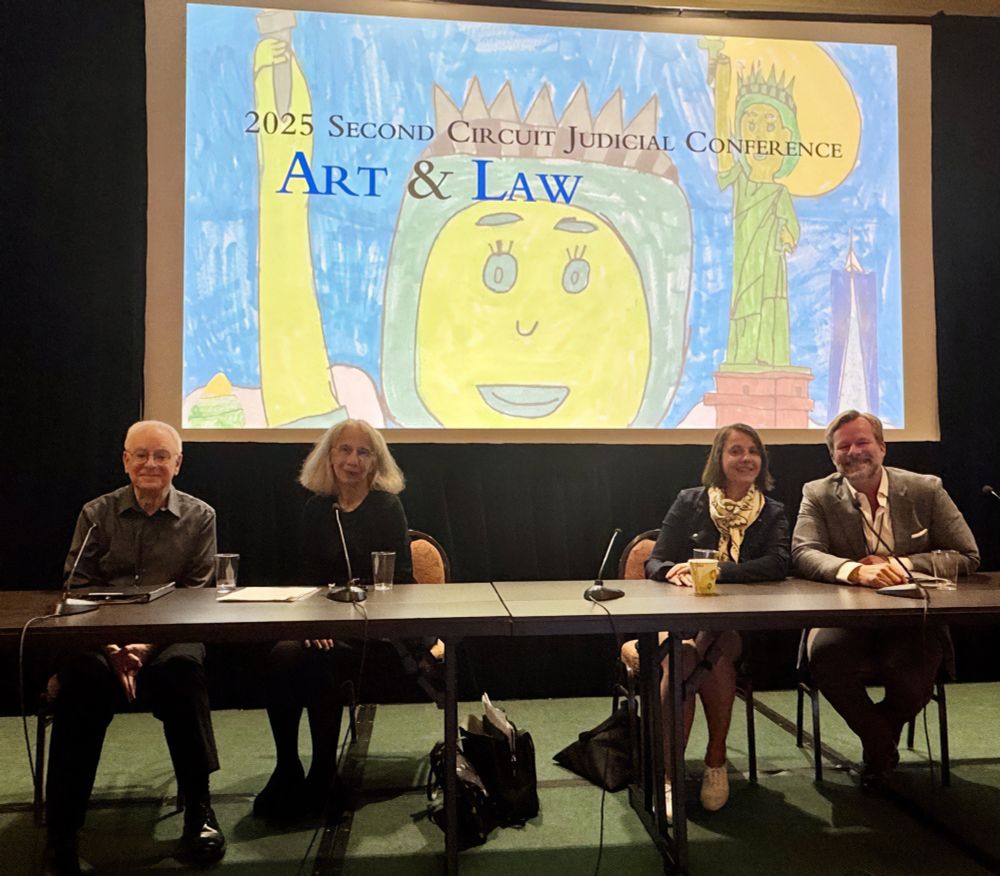
Professor @brsoucek.bsky.social recently participated in the 2025 Second Circuit Judicial Conference at the historic Sagamore Resort in Bolton Landing, N.Y. He spoke as part of the plenary session “Art & Legal Efforts to Silence, Tame and Cage It.” Read more at the link: bit.ly/4mKGczc
#UCDavisLaw
11.06.2025 23:19 — 👍 4 🔁 1 💬 0 📌 0
Hey institutional neutrality folks: now that Trump’s military trans ban is back in effect, are you going to say anything about the fact that you’re violating your own nondiscrimination policies when you host military recruiters? Is that an attack on your mission?
06.05.2025 18:27 — 👍 2 🔁 2 💬 0 📌 0
Thanks Jean! It was a pleasure to be on the show with you. Such impressive work you’ve done to make Law Day so powerful this year!
01.05.2025 19:23 — 👍 2 🔁 0 💬 1 📌 0
He retired in 2022
26.04.2025 16:08 — 👍 0 🔁 0 💬 0 📌 0
I was waiting for someone to post this. Federal courts ordered the Biden administration to engage in negotiations with another country. This is complex territory for sure.
But how much negotiation is really required to say "you know that guy we're paying you to hold? Put him on our plane tomorrow"?
17.04.2025 15:27 — 👍 182 🔁 47 💬 5 📌 1
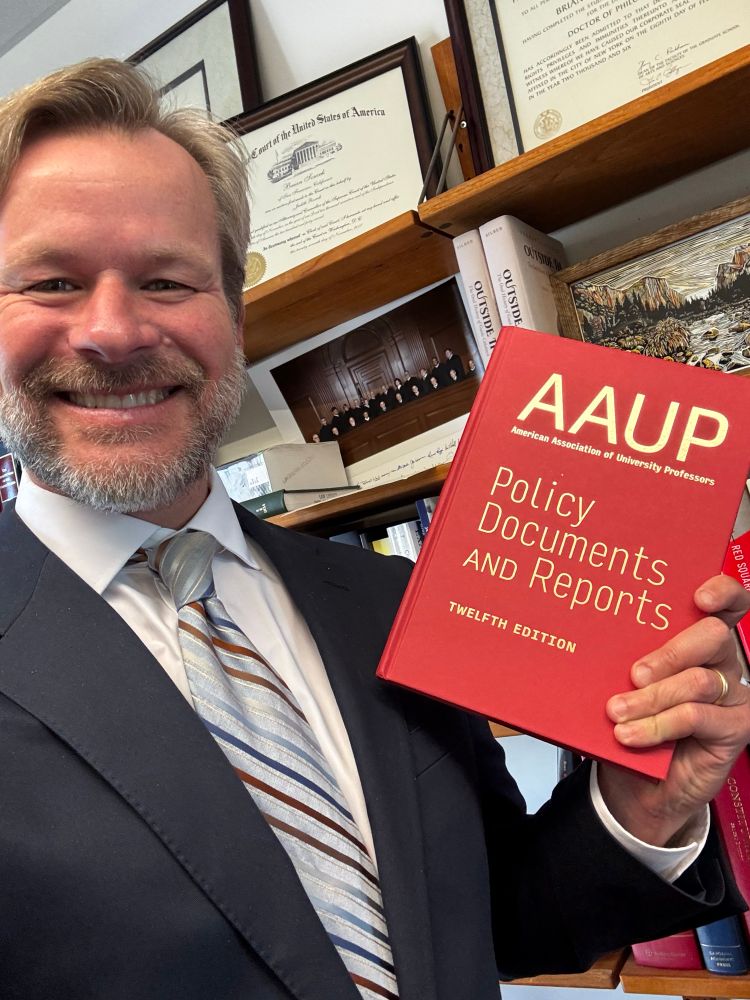
Perfect timing for the new edition of the @aaup.bsky.social #Redbook!
16.04.2025 20:50 — 👍 4 🔁 0 💬 0 📌 0
That’s amazing, Allison! I can’t wait to follow along
15.04.2025 15:24 — 👍 1 🔁 0 💬 1 📌 0
Interestingly, this letter is signed by Robert Hur; Hur was the MD USA during Trump I, and then the person assigned to investigate Biden's post-VP handling of documents. He wrote that Biden would present himself to a jury “as a sympathetic, well-meaning, elderly man with a poor memory.”
14.04.2025 17:30 — 👍 16 🔁 2 💬 1 📌 0
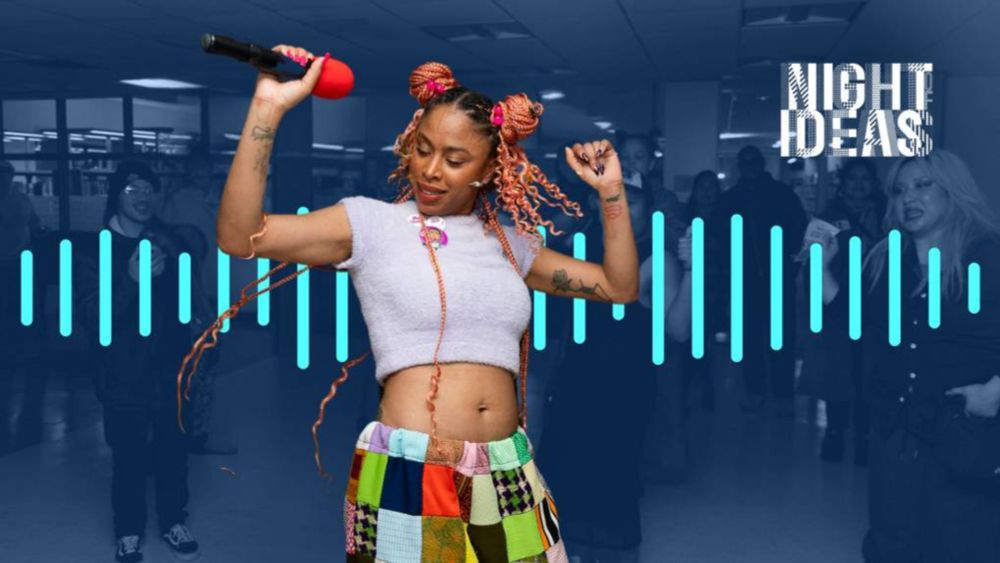
Night of Ideas 2025: (un)Common Ground | KQED
The Bay Area's biggest celebration of creativity and critical thought is back at the San Francisco Public Library and Asian Art Museum!
So excited to be a part of this year's #nightofideas at @sfpubliclibrary.bsky.social, 🗣️ about #universities + #freespeech . w/ @brsoucek.bsky.social + @dzambrano.bsky.social at 9 pm in the Hormel LGBTQIA Ctr, 3rd Flr. Capacity: 75 (est.) with standing room, so come early! ❤️🔥 www.kqed.org/event/5064
05.04.2025 15:42 — 👍 2 🔁 2 💬 0 📌 0
Happening tonight at the @sfpubliclibrary.bsky.social!
05.04.2025 15:17 — 👍 3 🔁 1 💬 0 📌 0
🧨
03.04.2025 20:59 — 👍 4 🔁 1 💬 0 📌 0
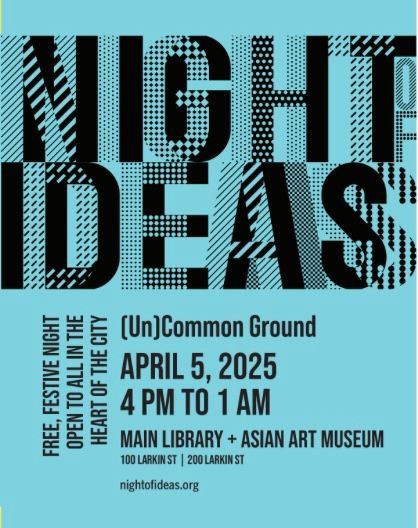
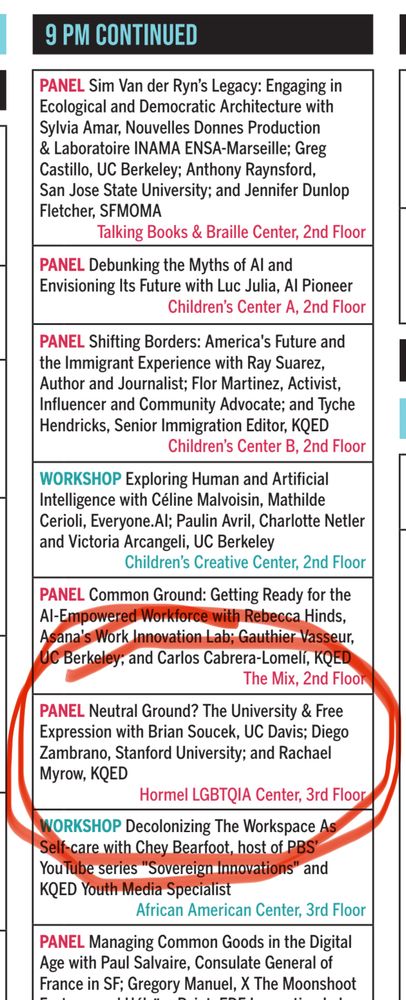
Bay Area folks: come join me tomorrow night @kqednews.kqed.org ’s Night of Ideas at the SF Public Library, where I’ll be debating institutional neutrality with @stanfordlaw.bsky.social’s Diego Zambrano. 9pm, and it’s free!
@ucdavislaw.bsky.social @ucdavis.bsky.social
04.04.2025 15:04 — 👍 4 🔁 1 💬 1 📌 1
The book is better because of you, @jneuf.bsky.social!
01.04.2025 22:51 — 👍 1 🔁 0 💬 0 📌 0
Well, this seems pretty darn timely!
01.04.2025 18:15 — 👍 1 🔁 1 💬 0 📌 0
Reporter, Los Angeles Times. I cover the University of California and more in higher and K-12 education. Former national and foreign correspondent. Big fan of reporting on religion. Based in Los Angeles.
The Council of UC Faculty Associations represents the University of California's faculty and works to ensure they can deliver the highest quality teaching, research and public service.
Writing a history of civil disobedience and the autobiography of my mother | Assistant Professor of Law and Society at UC Irvine | Previously: Cornell and Sorbonne | https://eraldosouzadossantos.com/
Associate Dean for Research & Faculty Development and Associate Professor of Law, University of Wisconsin Law School. I focus on copyright and technology law: ssrn.com/author=1498344
Law Professor, Stanford Law School
@KQEDNews | @NPRNews | Experts: "Formidable Provenance"+"The Queen of Succinct"
Kirkland & Ellis Professor of Law, Harvard Law School. Aligning Election Law: https://global.oup.com/academic/product/aligning-election-law-9780197662151.
Associate Professor at the University of Michigan. Author of Contesting Immigration Policy in Court: Legal Activism and Its Radiating Effects in the United States and France. All publications - umich.academia.edu/LeilaKawar
Professor Emerit at UC Davis. Researches in the history & philosophy of biology and environmental ethics. https://www.RLM.net/
New open-access book w/ U Chicago Press: _The Land Is Our Community: Aldo Leopold's Environmental Ethic for the New Millennium_
We represent 1,200 Lecturers and Librarians at UC Berkeley, UCSF, and UC College of the Law, San Francisco. https://linktr.ee/ucaftbayarea
Asst. Professor University of Oklahoma | Studying campus racial climate, higher education politics and policy, and university presidents | 2023-2024 UC National Center for Free Speech and Civic Engagement Fellow | 2023 ASHE Mildred García Research Award
philosophy prof at harvard * perception and polities * philosophy of journalism
Felicity Jones is the pseudonym of a Con Law prof and attorney in the US. Every one of us must take calculated risks to further liberty and justice for all. Visit https://thefelicitypapers.substack.com/ for more.
The magazine of the American Association of University Professors. https://www.aaup.org/academe | https://academeblog.org/
The Center explores the intersection of expression, engagement & democratic learning and considers what can be done to restore trust in the value of free speech
https://freespeechcenter.universityofcalifornia.edu/
Nambe Pueblo | Stanford Law Prof. | Former Senior Policy Advisor for Native Affairs @ #46 White House, and LDF & NCAI Attorney
Law professor researching civil rights, political violence, racial justice, and national security
I profess the law, especially w/r/t trademarks. Husband to one, father of four. Music nerd. Gamer geek.
Loula Fuller & Dan Myers Professor, Associate Dean for Research, FSU College of Law.
reader, writer, lawyer, repro & disability justice advocate 🏳️🌈❤️🔥♿️💚
Oakland, CA & Seattle, WA



![MILITARY RECRUITMENT AT UC DAVIS SCHOOL OF LAW
In accord with the University of California’s anti-discrimination policy and regulations
of the Associate of American Law Schools (AALS), the University of California, Davis
School of Law has a Non-Discrimination Policy & Statement of Equal Opportunity
providing that:
The UC Davis School of Law Career Services Office expects employers recruiting at
King Hall to share our belief that the diversity of our students' backgrounds,
experience and interests will enrich the legal profession.
UC Davis School of Law does not make its career services facilities or services
available to employers who discriminate in the selection of employees on the basis
of ... sex, gender, gender expression, [or] gender identity.
On January 27, 2025, President Trump issued an Executive Order directing the
Departments of Defense and of Homeland Security to revise their accession and
retention standards to presumptively ban service by people who are transgender,
finding that transgender status is “not consistent with the humility and selflessness
required of a service member” and with “a soldier’s commitment to an honorable,
truthful, and disciplined lifestyle.” A federal law, the Solomon Amendment, 10 U.S.C.
§ 983, denies most federal funding to a university that provides less access to military
recruiters than to other employers. For that reason, longstanding practice at King Hall,
as at other law schools, has been to grant access to miliary recruiters even when they fail
to comply with our policies.
As the U.S. Supreme Court wrote when it upheld the constitutionality of the Solomon
Amendment, “Nothing about recruiting suggests that law schools agree with any speech
by recruiters, and nothing in the Solomon Amendment restricts what the law schools
may say about the military’s policies.” Rumsfeld v. Forum for Academic and
Institutional Rights, Inc., 547 U.S. 47, 65 (2006). To make our position clear, we will
prominently post our non-discrimination…](https://cdn.bsky.app/img/feed_thumbnail/plain/did:plc:bviiczzhquhhqp6btmaw3z3r/bafkreieuvqbotdrob34z3fkj74ygjqg62fe64rbip24lzemyow5os5fq44@jpeg)








